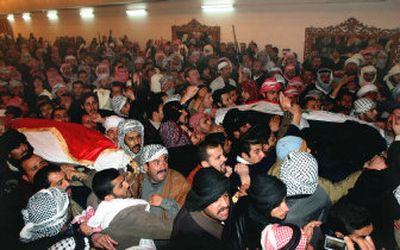Condemnation follows latest Iraqi hangings

BAGHDAD, Iraq – By the time the corpses of Saddam Hussein’s half brother and another top official, hanged before dawn Monday, arrived in the village of Ouja for burial, the word had spread among the mourners: The head of Saddam’s half brother had been severed from his body.
Many of the people who had gathered considered the decapitation of Barzan Ibrahim to be a calculated insult, another act by the Shiite-dominated government of Prime Minister Nouri al-Maliki to humiliate followers of the executed former president and all his fellow Sunni Arabs. A doctor inspected the remains to assess the government’s explanation that the noose inadvertently took off the head after Ibrahim dropped through the trap door of the scaffold.
“We knew that he would be executed and would join a parade of heroes, but Maliki, why did you behead him?” asked Salam al-Tikriti, 41, a relative of Ibrahim. ” We will cut your heads the same way that you are cutting the heads of the heroes of Iraq.”
In many parts of Iraq, the executions set off new waves of anger and celebration along sectarian lines, though Maliki’s government had gone to great pains to prevent the type of chaotic spectacle that accompanied Saddam’s hanging two weeks ago, when Shiite witnesses in the execution chamber taunted Saddam.
Shiites celebrated the new executions, while Sunni politicians vented. Alaa Makki, a Sunni legislator, said that justice was done but the manner of the execution was disturbing. “Everybody knows that when you hang people, rarely the head will be decapitated from the body,” he said, criticizing what he called a “revenge on the body.”
The hangings drew criticism from abroad as well. The Moroccan Human Rights Association said they were a “criminal political assassination masterminded by American imperialism.”
Secretary of State Condoleezza Rice, visiting Egypt, said she believed the hangings of Saddam and the two others were mishandled and should have been carried out with “greater dignity.”
Ibrahim, who ran Saddam’s intelligence service, and Awad Hamed al-Bandar, leader of Saddam’s Revolutionary Court, were put to death at 3 a.m. Monday, government spokesman Ali Dabbagh said. They had been sentenced to death for their role in the killings of 148 men and boys from the Shiite village of Dujail following an assassination attempt against Saddam in 1982.
Iraqi officials denied that the decapitation was intentional, saying that Ibrahim’s neck had been unable to absorb the noose’s force.
They showed silent video clips of the hangings to reporters but did not release the footage to the public.
By 6 p.m., the bodies had arrived in Ouja, about 100 miles north of Baghdad, and were greeted by more than 1,000 people. The crowd carried the corpses, wrapped in Iraqi flags, on their shoulders into a hall as chants rang out of “Allahu akbar” – “God is greatest” – and guns were fired into the air.
The hangings occurred on a day when two top outgoing U.S. officials in Iraq, Gen. George W. Casey Jr. and U.S. Ambassador Zalmay Khalilzad, told reporters that they were optimistic about the new plan to secure Baghdad, saying they sensed a deeper commitment by the Iraqi government to combat Sunni and Shiite extremists who are fighting in the capital.
The Shiite-led Iraqi security forces have been widely accused of operating death squads that target Sunnis while allowing Shiite militias in the capital free rein. But Casey added that he did not expect to see significant improvement in Baghdad’s security until the summer or fall.